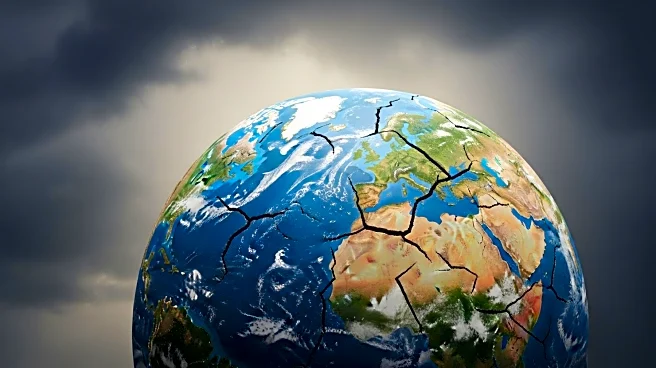What is the story about?
What's Happening?
The United Nations has reinstated sanctions on Iran, targeting its nuclear program. This move, known as 'snapback,' is part of the 2015 nuclear deal framework and aims to freeze Iranian assets abroad, halt arms deals, and penalize ballistic missile development. The sanctions come as Iran's economy struggles, with the rial at a record low and food prices soaring. The sanctions were triggered by France, Germany, and the UK due to Iran's restricted nuclear monitoring and deadlock in negotiations with the U.S. Iran's stockpile of enriched uranium remains a concern, as it approaches weapons-grade levels. The sanctions have heightened fears of further conflict with Israel and the U.S., and increased domestic repression.
Why It's Important?
The reimposition of sanctions on Iran has significant implications for global politics and regional stability. Economically, it exacerbates Iran's financial woes, impacting ordinary citizens with rising food prices and inflation. Politically, it strains Iran's relations with Western nations and could lead to further isolation. The sanctions also raise the risk of military conflict, as Iran's nuclear capabilities remain a contentious issue. The move by the UN reflects ongoing tensions between Iran and the international community, particularly concerning nuclear proliferation. The sanctions could also influence U.S. foreign policy, as diplomatic efforts continue to address Iran's nuclear ambitions.
What's Next?
The future of Iran's nuclear program and its international relations remain uncertain. The sanctions could push Iran to reconsider its stance on nuclear negotiations, potentially leading to renewed talks with the U.S. and other world powers. However, the risk of military escalation remains, especially if Iran continues to restrict nuclear site inspections. The international community will likely monitor Iran's response closely, as any aggressive actions could prompt further sanctions or military interventions. Domestically, Iran may face increased protests and civil unrest due to economic hardships, challenging the government's ability to maintain control.
Beyond the Headlines
The sanctions highlight broader issues of international diplomacy and the challenges of enforcing nuclear non-proliferation. They underscore the complexities of balancing economic sanctions with humanitarian concerns, as ordinary Iranians bear the brunt of economic hardships. The situation also raises ethical questions about the effectiveness of sanctions as a tool for achieving political objectives, particularly when they disproportionately affect vulnerable populations. Long-term, the sanctions could influence global nuclear policy and the role of international organizations in mediating conflicts.














